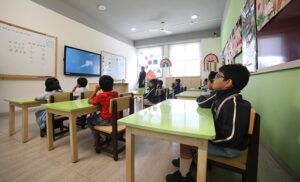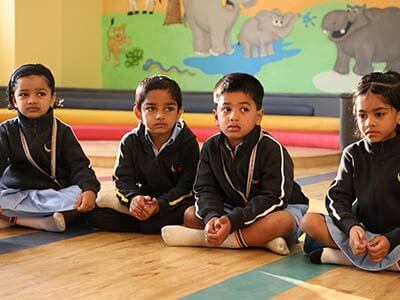Download our FREE Academic Calendar now! 📚 Start your child’s journey to success.
Kids are learning from home in the wake of coronavirus. But many parents and teachers are worried that studying at home and staying in their room all day long has adverse effects on the socialization skills of the kids. This is understandable. Some kids have a hard time adjusting to the fact that they can’t eat lunch with their friends or play with them during break time anymore. They can’t play with their classmates. They haven’t seen their teachers except through video classes. For some kids, the arrangement could take a toll. You’ll need to find ways to help your kids build and maintain connections at this time.
Here are some tips:
1. Talk to the Teachers
What are the classroom activities? Do they provide plenty of opportunities for the kids to socialize? That’s a question you’ll want to put to your children’s teachers at their international school in Pune. Find out more about what’s happening during the lectures and what the teachers are doing to encourage online socialization among them. It could be done by assigning group projects. These need collaborative effort, so the kids have a chance to brainstorm with each other on ideas, and that’s one way to give them more opportunities to socialize.
2. Encourage Calls
Has it been a while since your kids had seen their friends? Please encourage them to make video calls to their friends, then. This will help keep the isolation at bay. They wouldn’t think they’re alone if they have their friends to talk to at any time. Encourage that connection. Ask about your children’s friends, too. Which ones have they had contact with recently? If they haven’t reached out, urge them to. Some kids having problems adjusting to online classes feel that they’re isolated in their rooms. Having their friends to talk to can dispel that feeling, improve their mood, and get them ready to face anything.
3. Talk to Your Kids
Don’t discount the power of your words or influence. If you think your children are having a hard time at school, and it’s not the grades, if you see how much they’ve been missing their classmates, teachers, and friends, talk to them. Tell them it’s all right and normal to feel sad about how things have changed. But that doesn’t mean they can’t do anything about it. They can still talk to their friends, classmates and teachers. And when they tell you “It’s not the same,” don’t lie. It isn’t. But that’s the point. We’ll learn to adapt and form new ways to bond and communicate. Make sure your kids realize that. That could help them manage their sadness and distress.
4. Play with Them
Still, online games and video calls are different. If your kids are still lonely or sad, play with them. That’s your bonding with your kids, and so what could be a better way to spend time than that? Many parents have a misconception that they’ll have their kids forever. It is a good time to soak up their presence and build memories to last a lifetime. Your kids won’t be kids forever. They’re already in primary school. In a few years, they’ll be finishing high school and college and then work. They’ll be moving out. They’ll be busy doing what they want with their lives. And you’ll let them. But before all that, you’ll want to make the most out of your time with them. This is one way to do that. This year spend plenty of quality time with your kids. Cherish that time.
5. Let Them Go on Playdates
There’s a safe way to do that: that is, get everyone tested to make sure everyone’s negative for the virus. Then hold those play dates. But if you want something less tiresome and requires minimal preparation, pitch the idea of going on virtual play dates with their friends. Some video games require multiplayer teams. Allow your kids to engage in those games with their friends if they haven’t already. It’s a fun way to stay connected while everyone is still studying at home.
6. Do a Project
Another way to keep your kids busy is to do a home project. Transform a portion of the backyard with their help. That will get your kids involved. Get the whole family involved if you want. The more, the merrier. It’s another opportunity to help your kids socialize and spend time as a family. Bonding times are always precious, and you’ll all look back on this time years from now. You’ll remember how you built that yard or put the cement or mixed it. You’ll remember putting the grass on the area and picking out the chairs just for the perfect spot.
7. Do a Zoom Party
Don’t forget that your kids take their cue from you. Don’t just focus on their needs. Make sure you’re meeting your socialization needs as well. People need other people, even to talk to, or catch up. Do that with your friends. A zoom party is an excellent way to catch up, shoot the breeze, and feel that everything is normal, at least for the next hour or so. That can help more than you know. If you feel like you’re on a tightrope from holding everything together, if you’re stressed out from having to watch over the kids a lot more while juggling work and home chores, then take a break. You’ll look after your kids’ needs much better if you’re well-rested and in tip-top shape yourself.
8. Build New Connections
Let your kids build new connections. Encourage them to talk to other kids or reach out to those they’ve never spoken to in school or class before. If there are kids in the neighbourhood, what about encouraging your kids to make friends with them too? You can follow social distancing rules all while allowing your kids to experience that they’re connected and loved, that they have friends, that they’re able to manage situations and look for the positive in them.
With the tips mentioned above, you can get kids to stay more connected with other kids and unwind with you as a family and with others.































